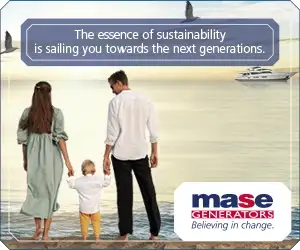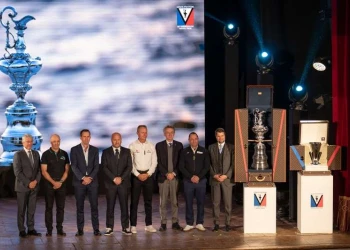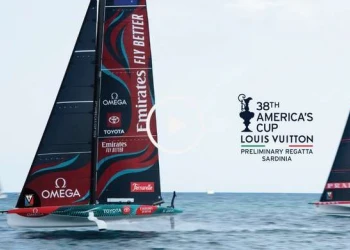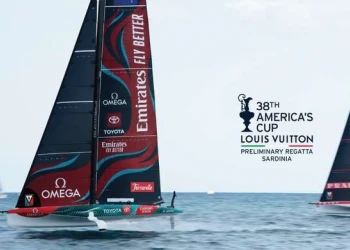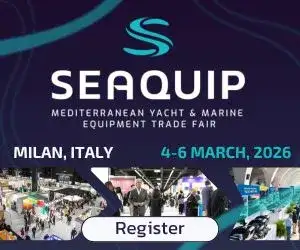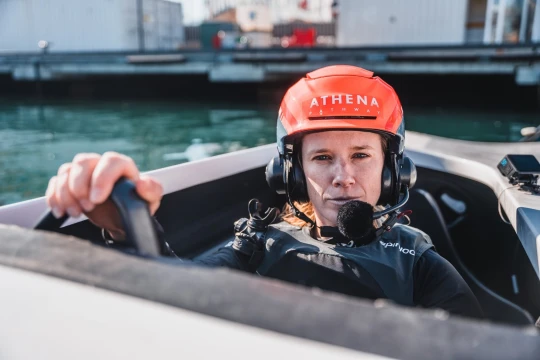
Hannah Mills
Hannah Mills on International Women's Day & The Puig Women's America's Cup
Fifty years have passed since Billie Jean King, fresh from her watershed victory against Bobby Riggs, founded the Women's Sports Foundation. King's vision was clear: to advocate for the access, rights and opportunities of women and girls in sport, and to leverage its transformative power to create a more equitable and inclusive society.
International Women's Day offers us a chance to celebrate to achievements of women and girls, increase momentum towards achieving gender equality worldwide, and shine a light on the obstacles that continue to impede full equity.
For me, as a female athlete, today also serves as an opportunity to reflect on the role that pioneers like King have played in reshaping the sporting landscape over the last fifty years. It's a time to acknowledge the progress that has been made towards dismantling barriers once and for all, ensuring that women and girls can pursue their ambitions entirely unconstrained, in sport and beyond.
The significance of the America's Cup in the realm of sailing is unparalleled. As the world's oldest international sporting trophy, it represents a pinnacle of technical innovation, skill, and human performance. And yet, throughout my journey from immensely competitive little girl with a passion for sailing to becoming an Olympic champion, the America’s Cup always seemed elusive. Not due to lack of skill, ambition or hard work, but because, beyond the exception of a few trailblazing individuals like Dawn Riley, there because of the absence of a clear trajectory to participation.
With its inaugural edition taking place in 1851, the America’s Cup has primarily been an arena for male athletes. Not just because of the prevailing societal attitudes that contextualised its early history, but also because of most of the roles on traditional sailboats have been physical roles which involve grinding and pulling on ropes – naturally falling to men. With the introduction of foiling in the 2013 America’s Cup, the importance of physical strength in many roles diminished, but it was the guys with prior participation that were first to get involved in this new style of sailing. Opportunities for female athletes to play catch up with our male counterparts have been few and far between, making the systemic gap in experience very difficult to close.
The inclusion of a Women’s event for the first time in the competition’s 174 year history demonstrates that change is not only necessary but possible. I strongly believe that women and men can and should compete together on equal terms in sailing, but this is only possible through first achieving equity.
The Women’s America’s Cup is a massive step towards ensuring female sailors are given the platform and resources to mitigate prior disparities in experience and opportunity. The visibility of the event will be huge, and knowing that there might be young girls that come away from watching the racing with the belief that the America’s Cup is within their reach will be really special for all of us competing athletes.
Ben Ainslie and I founded Athena Pathway in 2022, with the aim of supporting and developing the careers of Britain’s youth and female sailors from grassroots level into competitions like SailGP and the America’s Cup. A squad of sailors from Athena Pathway will be representing Britain for the Youth and Women’s Regattas in Barcelona in the Autumn, and beyond this year’s Cup, the Pathway will build on the progress already being made to level the playing field in high-performance foiling-sailing, inspire the next generation, and bring diversity into the sport both on and off the water. We need the infrastructure of programmes like this to really push the dial forward!
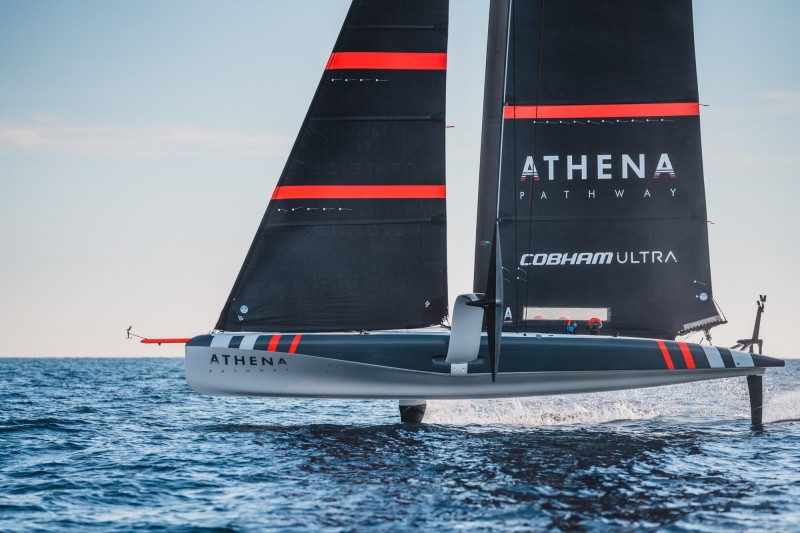
I have seen first-hand how quick the progress can be when the opportunity is there through my role as strategist for the EmiratesGBR SailGP Team. The League’s Women’s Pathway has been instrumental in giving talented female athletes the training time and resources to develop our skillsets across multiple different roles on F50 Catamarans, and for myself and Hannah Diamond, it is definitely a huge confidence booster knowing that we will go into the Cup with a solid background and extensive experience in high-performance foiling racing.
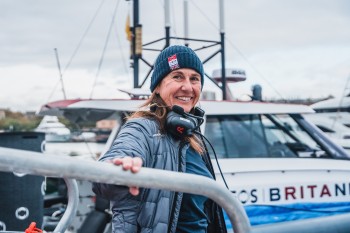
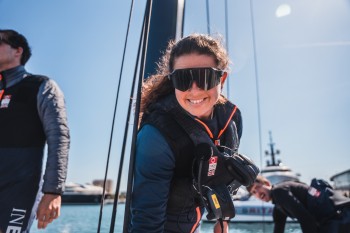
Elvira Llabres, INEOS Britannia Performance Analyst & Sophie Heritage INEOS Britannia Boat Captain
Accelerating momentum towards gender equality in sailing’s shoreside roles is also a key focus for Athena Pathway, both during this Campaign and as a longer term mission. With responsibilities that include all the technical and operational aspects of ensuring the boat is in working order and ready and able to sail each day, the shore team is the backbone of success in a competition like the America’s Cup. Like many STEM focused fields and the marine industry more broadly, however, these roles have often been male-dominated. This imbalance is not due to a lack of ability, but largely because of ongoing issues with access and a lack of talent pipelines, which are necessary for building the unique skillset and confidence required to excel at the highest level.
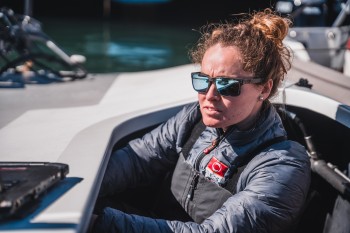
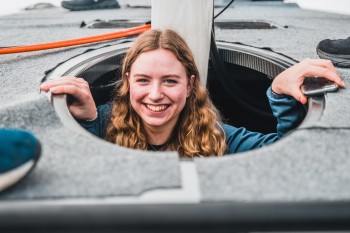
Athena Pathway Systems engineer Suzy Peters & Engineer Ana Paterson
The Senior British America’s Cup Team have been vital in facilitating upskilling opportunities on the AC40 for several of our shore crew, including Boat Captain Sophie Heritage and Systems engineer Suzy Peters, with a focus on opening up career paths and providing the experience required to not only to become hugely valuable components of the team’s success, but also to lead the way for the next generation of female engineers, designers and technicians in the sailing industry. The unique challenges many women have had to navigate to get to equal footing with men tends to give them quite different perspectives and ways of doing things, and the industry needs to realise the value of inclusivity and diversity as crucial drivers of competitive performance, and in turn provide reflexive performance environments that allow everyone to achieve their potential, irrespective of gender.
The presence of women in leadership positions at governance and senior management level is also vital if we are to achieve a gender equal future for sailing. Despite a huge amount of research to suggest that diverse boards have a significant positive impact on the commercial and operational facets of organisations across multiple fields, females are still hugely under-represented in decision-making level of the sport. It’s brilliant that Athena Pathway has the extensive experience of Jo Grindley on its board, whose career has included securing funding for three Olympic campaigns for Ben and instrumental roles in the founding, development and commercial leadership of the British America’s Cup Team and the EmiratesGBR SailGP Team. The inspiration and guidance of individuals like Jo are central to paving the way for the next generation of female leaders rising to the top and reshaping the landscape of competitive sailing and sport as a whole.
Changing the way things are done is never easy, but when the 12 competing teams head out on the waters of Barcelona in the Autumn for the Womens AC, it will show the world that there are no limits to what is possible when you provide the platform, opportunity, and equity for female athletes to succeed on equal footing. More investment, resource and awareness is still desperately needed for sustained, systemic progress and a truly playing field in sailing, but the event is definitely a step in the right direction. A Women’s America’s Cup may be long overdue, but it is also just the beginning. Let’s get racing!


